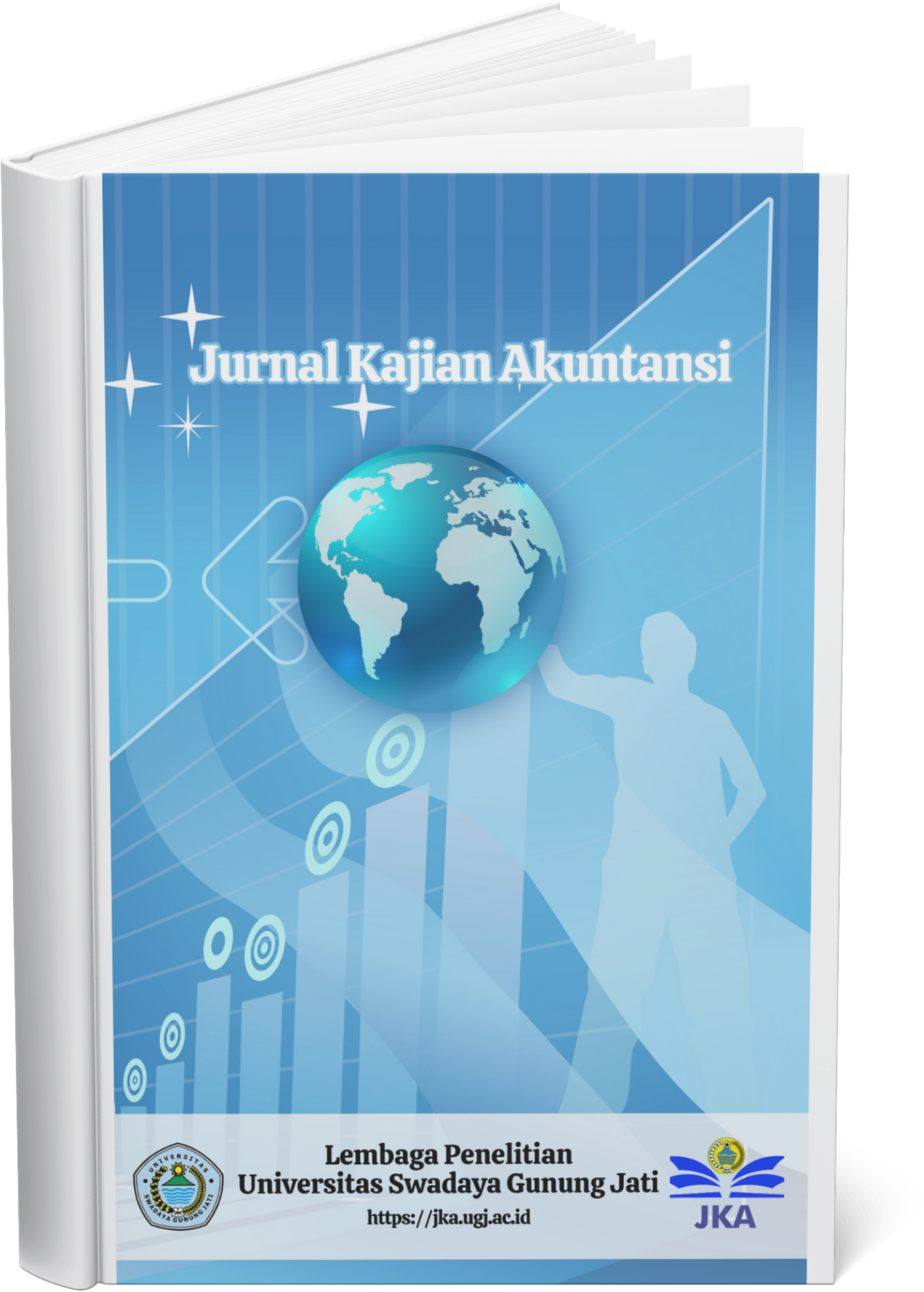Obedience Pressure and Audit Judgment: Does The Auditor Personality Have A Role?
DOI:
https://doi.org/10.33603/jka.v6i2.5997Abstrak
Abstract
Auditors must use their professional judgment to determine matters related to the conducted audit, in both financial audits, performance audits, and audits with specific purposes according to the audit standard. The purpose of this research is to analyze the effect of obedience pressure toward audit judgment by using personality as a moderating variable. This study collect data using purposive sampling to give a questionnaire on 56 respondens from external auditors in BPK (Audit Board) Representative of Central Java, Indonesia. The method of analysis in this research used Moderating Regression Analysis. The result of this research showed that obedience pressure has a negative effect on audit judgment. Moreover, it was determined that three of the personality traits, namely openness to experience, conscientiousness, and neuroticism have significant effects on the relationship between obedience pressure and audit judgment. However other personality traits, that is extraversion and agreeableness do not have significant effects on the relationship between obedience pressure and audit judgment. Based on the results, the relationship between obedience pressure and audit judgment is affected by openness to experience, conscientiousness, and neuroticism.
Keywords:Â Audit judgment; Auditor personality; and Obedience pressure.
Referensi
Agustini, N.K.R & Merkusiwati, N.KA. (2016). Effect of Compliance Pressure, Auditor Seniority and Time Budget Pressure on Audit Judgment. Jurnal Akuntansi Program S1, 15 (1), 1-13.
Barrick, M.B. & Mount, M.K. (2005). Yes, Personality Matters: Moving on to More Important Matters. Human Performance, 18 (4), 359-372.
Boeree, C.G. (1997). Personality Theories. Psychology Department Shippensburg University. Original E-Text-Site: http://www.ship.edu/%7Ecgboeree/ pers-contents.html.
Bowling, N.A. & Eschleman, K.J. (2010). Employee Personality as a Moderator of the Relationships Between Work Stressors and Counterproductive Work Behavior. Journal of Occupational Health Psychology, 15 (1), 91-103.
Briggs, S.P., Copeland, S. & Haynes, D. (2007). Accountants for the 21st Century, Where Are You? A Five-Year Study of Accounting Students’ Personality Preferences. Critical Perspectives on Accounting, 18, 511-537.
Costa, P.T., & McCrae, R. R. (1992). The five-factor model of personality and its relevance to personality disorders. Journal of Personality Disorders, 6(4), 343–359.
Fanani, Z, Budi, V.M.F. & Utama, A.A.G.S. (2021). Specialist Tenure Of Audit Partner And Audit Quality. Accounting, 7, 573–580.
Fiske, S. T., & Taylor, S. E. (1991). Social cognition (2nd ed.). New York: McGraw-Hill.
Fitriani, S. & Daljono. (2012). The Effect of Obedience Pressure, Task Complexity, Knowledge and Ethical Perception on Audit Judgment. Diponegoro Journal of Accounting, 1 (1), 1-12.
Goldberg, L.R. (1990). An Alternative Description of personality: The Big Five Factor Structure. Journal of Personality and Social Psychology. 87, 530-541.
Heider, F. (1958). The Psychology of Interpersonal Relations. New York: Wiley.
Jaffar, N., Haron, H., Iskandar, T.M. & Salleh, A. (2011). Fraud Risk Assessment and Detection Fraud: The Moderating Effect of Personality. International Journal of Business and Management, 6 (7), 40-50.
Jamilah, S., Fanani, Z. & Chandrarin. G. (2007). Effect of Gender, Obedience Pressure, and Task Complexity on Audit Judgment. National Accounting Symposium X Unhas, Makassar, Indonesia.
Lindrianasari, Hartono, J., Supriyadi, & Miharjo, S. (2012). Personality as a Moderating Relationship CEO's Perception of Compensation Received on CEO's Desire to Leave the Company Voluntary. Paper presented at the XV National Accounting Symposium event, Banjarmasin, Indonesia.
McCrae, R.R. & Costa, P.T. (1987). Validation of the Five Factor Model of Personality Acros Instruments and Observers. Journal of Personality and Social Psychology, 52 (1), 81-90.
Praditaningrum, A.S. & Januarti, I. (2012). Analysis of Factors Influencing Audit Judgment (Case Study at BPK RI Representative of Central Java). Paper presented at the XV National Accounting Symposium event, Banjarmasin, Indonesia.
Rustriarini, N.W. (2014). Personality Traits as Moderators of the Relationship between Job Stress and Audit Dysfunctional Behavior. Jurnal Akuntansi dan Keuangan Indonesia, 11 (1), 1-19.
Sahifuddin, A., Haryadi, B., & Zuhdi, R. (2015). Unraveling Professional Judgment Auditors in the Financial Statement Audit Process (Phenomenological Interpretive Study at KAP Paimin & Paijo). Paper presented at the XVIII National Accounting Symposium, Medan, Indonesia.
Sherman, R.A. & Funder, D.C. (2009). Evaluating correlations in studies of personality and behavior: Beyond the number of significant findings to be expected by chance. Journal of Research in Personality 43, 1053–1063.
Widhiastuti, H. (2014). Big Five Personality as a Predictor of Creativity in Improving Board Member Performance. Jurnal Psikologi, 41(1), 115-133.
Yustrianthe, R.H. (2012). Several Factors Affecting Government Auditors' Audit Judgment. Jurnal Dinamika Akuntansi, 4 (2), 72-82.
Unduhan
File Tambahan
Diterbitkan
Cara Mengutip
Terbitan
Bagian
Lisensi
- Authors retain copyright and grant the journal right of first publication with the work simultaneously licensed under a Creative Commons Attribution-ShareAlike (CC-BY-SA 4.0) that allows others to share the work with an acknowledgment of the work's authorship and initial publication in this journal.
- Authors are able to enter into separate, additional contractual arrangements for the non-exclusive distribution of the journal's published version of the work (e.g., post it to an institutional repository or publish it in a book), with an acknowledgment of its initial publication in this journal.
- Authors are permitted and encouraged to post their work online (e.g., in institutional repositories or on their website) prior to and during the submission process, as it can lead to productive exchanges, as well as earlier and greater citation of published work.
